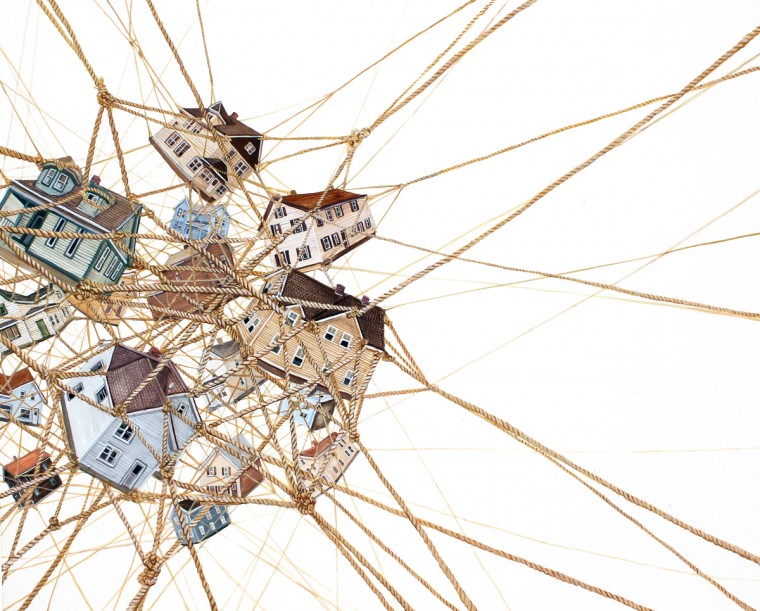 Amy Casey, Bound, 2010, Acrylic on Panel, 10″ X 12″
Amy Casey, Bound, 2010, Acrylic on Panel, 10″ X 12″
Phase Transition
A loud clatter announces the dumpster dropped in my neighbor’s driveway. I knew she had died. I knew he had dementia. I barely saw them over the past twenty years. We waved from discrete distances. The dumpster draws me on my morning run. Some magnetic pull beyond the reach of science. I slow down and peer in. Each day their children have added more. Old clothes, croquet mallets, a suitcase plastered with stickers, two rakes, a garden hose. Last week four weathered chairs. I imagine my neighbors at Walmart or Ikea one breezy spring afternoon. Trying to decide between the grey and the green. Would the cushions need to be brought in out of the rain? Would they match the umbrella? I see them sitting in their new green chairs sharing turkey and cheese sandwiches under the striped umbrella. Sipping Chardonnay as the hours dim. Talking about doctor’s bills, Rachel Maddow, who should call the plumber, would leftovers work tonight. Yesterday a scratched oak cabinet with a missing drawer. Was it once filled with toys for grandchildren: Barbie dolls, Calico Critters, Thomas tracks and trains, orphaned puzzle pieces, cars with chipped paint and missing wheels. Last night there was a double mattress on top.
Today the dumpster is full. Someone will come to take it away.
____________________
Claire Scott
Review by donnarkevic
What a stinging commentary from Scott about the disenfranchisement of society. The sound of a dropped dumpster catches the narrator’s attention. But what of the voices of the neighbors? It seems conversation existed as a wave of the hand “from discreet distances.” The distance is now shortened by death, and a strange voyeurism begins. From a run, the narrator slows to a walk to a full stop in order to get a glimpse of a life left unnoticed for twenty years. Even the children and imagined grandchildren have been unobserved. Only the refuse commands attention. What can be supposed from the dead neighbors’ lives from their garbage? And what was missed? Could the neighbor have played croquet with the couple and sipped Chardonnay afterwards? The “missing drawer” from the oak cabinet perhaps symbolizes the runaway neighbor who holds nothing of value: no neighborhood friends, no neighborhood memories, no neighborhood. The saddest remnant, “a double mattress,” stresses the point that two people have been left unnoticed. Scott’s final sentence, “Someone will come to take it away,” concludes the theme. How perfect for an anonymous “someone” to haul away the lives of the narrator’s anonymous neighbors.
Review by David Memmott
This prose poem resonated with me as I had a similar experience recently: a neighbor dying and her children coming to sort things out and bring in a dumpster. The catalog of items found in the dumpster opens into story as the reader goes with the recently departed through Walmart to find lawn furniture and the speaker’s memory of leisure, imagining what was once in a missing drawer. And then as an exclamation point, “a double mattress on top,” muffling the noise of what has been lost. The line set off from the narrative block comes and takes it all away. It’s a very clean process, picking up the dumpster, so we do not dwell too long on the meaning of things. Good poem.
